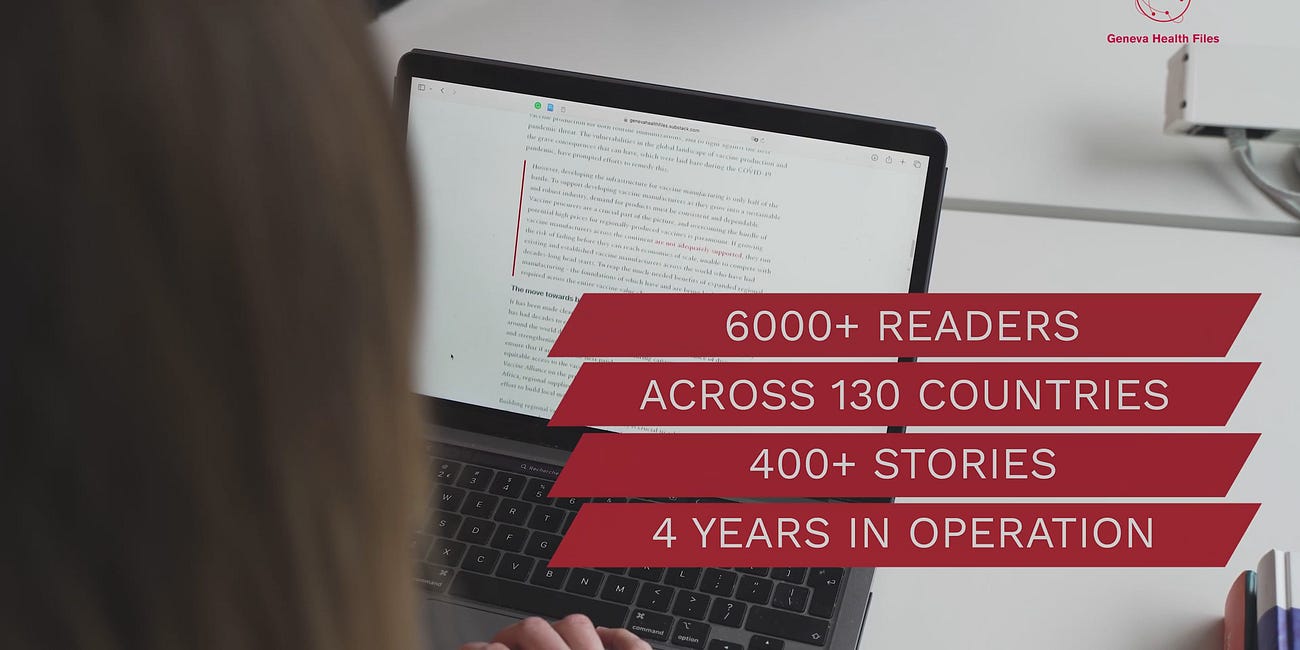Geneva Health Files October-December 2024 [The GHF WRAP]
The Q4 2024 Roundup from Geneva Health Files
Dear Readers,
Presenting the final wrap of 2024 that captures the last three months of our reportage.
Here is a snapshot of the range of stories from us, including comprehensive coverage of the legal discussions on the Pandemic Agreement negotiations getting deep into the technical details around compensation, pathogens access and benefits sharing, among other areas. We also reported on the G20 discussions on local production, WHO financing and the changing geopolitics and its impact on global health. Our guest contributions ranged on a number of different topics including on shifting priorities of manufacturers of insulin products, digital health services, nutritional labeling, and one that examined lobbying disclosures in the U.S. that revealed the fight against the TRIPS waiver discussions at the WTO and the negotiations at WHO.
My colleague Sana Ali has compiled this for you. (See here for our earlier work during this year: Q1, Q2, Q3.)
We make every effort to bring you varied coverage of important, yet under-reported areas in global health policy-making.
Please note that we will have fewer editions during the upcoming Christmas break, and our regular reported editions will resume in early January 2025.
Support public interest global health journalism, become a paying subscriber. Tracking global health policy-making in Geneva is tough and expensive. Help us raise important questions, and in keeping an ear to the ground. Readers paying for our work makes this possible.
Our gratitude to our subscribers who help us stay in the game!
More soon!
Best,
Priti Patnaik & Sana Ali
Feel free to write to us: patnaik.reporting@gmail.com or Follow us on Twitter: @filesgeneva
Highlights: October-December 2024
Compiled by Sana Ali
GHF Wrap: Oct-Dec 2024
Treaty talks
[Dec 06] Rancor Over Disagreement On Prevention Obligations in Pandemic Agreement Talks, Withholds Progress in Key Areas
WHO member states were unable to narrow down the road to consensus this week in the latest round of negotiations towards a new Pandemic Agreement, as the most contentious provisions continue to divide them, indicating a lack of political will to compromise on entrenched positions.
[Dec 03] “No One Wins” A Path Towards Consensus? Positions Remain Taut in the Pandemic Agreement Negotiations
Countries continue to beaver their way through the draft text of the Pandemic Agreement, in windowless negotiating rooms, still determined to make progress as fundamental shifts occur across the Atlantic. The assumption of office by President-Elect Donald Trump in the United States, in January 2025, has cast a long shadow in the already challenging circumstances of these negotiations that have gone along for three years now.
[Nov 29] “Unhindered” Access in Global Health Negotiations: Navigating the Intersection of Sanctions and Humanitarian Imperatives
WHO member states remain painfully divided on whether vulnerable populations in humanitarian settings, and in sanctioned countries should have “unhindered” access to medical services and products during health emergencies and pandemics.
The draft text of the Pandemic Agreement references the term “unhindered”, which is a continues to be a major flashpoint in the negotiations.
[Nov 15] Countries Soldier On To Negotiate Pandemic Agreement, Make Slow But Sure Progress
Countries made slow but sure progress across a range of provisions in the draft Pandemic Agreement, even as they continue to wrestle with the toughest provisions continue to lack consensus. The deliberations continued through formal and informal sessions in the course of the two-week marathon negotiating meeting in Geneva between 4th-15th November, 2024. In this story we look at the progress made in some of the key provisions, and also discuss the areas of contention in the language of the draft Pandemic Agreement. This analysis is based on the draft text dated November 14, 2024.
[Nov 11] A Double-Edged Negotiation: Liability & Compensation in the WHO Pandemic Agreement
The headlines of pharmaceutical companies demanding sovereign assets of countries as collateral against “potential legal claims from adverse vaccine effects” at the height of the pandemic of COVID-19, has been one of the more striking snapshots from the period. Clearly no public official with their backs against the wall, wants to be in such a one-sided negotiation again.
In the ongoing negotiations for a new Pandemic Agreement, countries have struggled to agree on language for liability and compensation.
[Nov 6] "Substance Over Speed": Countries' Response to December Deadline To Conclude Pandemic Treaty Talks
Many WHO member states have emphasized the need for a meaningful Pandemic Agreement instead of rushing to conclude negotiations in December 2024, although a few countries in Africa, among others, have underscored the need for a year-end deadline.
[Oct 24] Renewed Push for A December Deadline To Conclude The Pandemic Agreement
Key actors in the negotiations on a new Pandemic Agreement are making vigorous and renewed efforts to see if countries can reach consensus and conclude these discussions in December 2024. Some of these actors reportedly include the Bureau of the Intergovernmental Negotiating Body set up in 2021 to establish this agreement, the World Health Organization led by Director General Tedros Adhanom Ghebreyesus, diplomatic sources in Geneva say.
The Files-in Depth
[Nov 27] The Multi-Faceted Struggles of Addressing Diabetes in India Amid Global Shifts In Insulin Production
Insulin costs about $2.50 a vial in India, $30 out of pocket in the United States and $20-$40 in Canada. While the price per vial may be low in India, insulin - an essential, life-saving drug for people with Type 1 diabetes, remains inaccessible to millions of Indians because of difficulties in procurement, unreliable cold-storage facilities and a lack of education about its use.
[Nov 22] WHO Secures Half Its Target For Funds Amid Dire Geopolitics. More Predictable Financing, But Insufficient
WHO has managed to secure funds of up to US$ 3.8 billion for the next four years on the back of pledges from some of its member states, the private sector, foundations and multilateral organizations. This amount also reflects signed funding agreements and expected funding from partnerships, senior officials said last week.
[Nov 8] Using TRIPS Flexibilities: Easier Said Than Done?
Recent health crises have raised persistent policy concerns on affordability and availability of medical products. In this context, most of the discussions have focused on patents.
Interestingly, both the critics and supporters of the Trade-Related Aspects of Intellectual Property Rights [TRIPS] Agreement at the WTO, cite the existence of flexibilities in the Agreement in order to support their argument.
[Nov 4] Brazil Brings Technology Transfer into the G20 Fold
A proposed Global Alliance for Local and Regional Production and Innovation was launched at the G20 Health Ministerial Meeting last week (October 29-31 2024) in Rio de Janeiro. Brazil holds G20 Presidency this year, and has led efforts towards such an alliance aimed at reducing reliance on a few countries for critical health supplies and enhancing global health equity. The G20 Presidency will be held by South Africa in 2025.
[Nov 1] WHO Investment Round: Difficult But Defining
The WHO Investment Round event in Brazil is less than three weeks away. So far WHO has been able to garner US $ 1.1 billion as on October 2024. Although far from the initial goal of US $7 billion, these funds pledged so far are mostly flexible in nature marking a significant change in the way the WHO will be funded in the short to medium term.
[Oct 28] Lobbying Disclosures in the US: How Big Pharma Fought the TRIPS Waiver & is Pushing for Strong Intellectual Property Protection in the Pandemic Agreement
In October 2020, India and South Africa, recognizing the unprecedented urgency of the COVID-19 pandemic, proposed a temporary waiver from certain provisions of the World Trade Organization (WTO) Agreement on Trade-Related Aspects of Intellectual Property Rights (TRIPS) in order to ensure that intellectual property (IP) would not be a barrier to timely and affordable access to medical tools for COVID-19. The negotiations that followed this proposal amounted to over three years of discussions at the WTO that stand in stark contrast to the urgent action required to address the COVID-19 pandemic.
[Oct 15] Mandatory & Universal Nutrition Labelling: Pressures and Interests
As WHO urges widespread adoption of front-of-pack nutrition labels to curb diet-related diseases, Europe is lagging. Corporate and political resistance have stalled the ‘Nutri-Score’ proposal, drawing from the same old lobbying playbook once popularized by tobacco giants. Consumers and public health are paying the price
[Oct 9] Review of the TRIPS Agreement at the WTO: Reforming TRIPS for Global Equity
There are growing calls to make the intellectual property rules governed by the WTO, more “fit for purpose” to respond effectively to complex crises including health emergencies and climate change. WTO members are discussing a potential review of the Agreement on Trade-Related Aspects of Intellectual Property Rights (TRIPS), in the light of the policy failures during the COVID-19 pandemic. It has also been 30 years (April 15, 1994), since the Agreement was concluded.
[Oct 2] Mapping Digitization of Health Services in India: Strengths, Vulnerabilities & Opportunities
In India, the pandemic catalysed the rapid digitisation of healthcare services, reshaping the landscape of health governance. While these advancements brought about significant improvements in accessibility and efficiency, they also raised complex political, legal and socio-economic issues. This article critically examines the impact of COVID-19-induced digitization of healthcare in India, focusing on the key digital tools introduced, and the challenges and implications of these technologies.
Guest Essays
[Nov 19] Global Health Insecurity in a Second Trump Term
Trump’s core “America First” values are anathema to the animating principles of global health—mutual solidarity, international cooperation, an abiding concern for marginalized and disadvantaged people, and equitable access to lifesaving public health tools. At his core, Trump disdains international institutions like the World Health Organization (WHO) and global agreements like the International Health Regulations (2005, amended in 2024) (IHR), a future Pandemic Treaty, and the Paris Agreement.
[Oct 22] Financing: Don't Let It Be An Afterthought In The Pandemic Agreement
It has been almost three years since the Intergovernmental Negotiating Body (INB) started negotiations on the pandemic agreement. Although many essential topics have been, and are still being discussed, one crucial component that has not been discussed enough and has been under analyzed is financing.
The Files Brief
[Nov 13] Slippery Slope: Geopolitics and the Pandemic Agreement Negotiations
Late last week, WHO member states decided against holding a special session of the World Health Assembly in December in order to adopt a new Pandemic Agreement. Countries were of the view that there wasn’t sufficient consensus, with many areas are yet to be agreed upon. But a special session in the months preceding the May 2025 deadline is also not ruled out, sources close to the process say.
[Oct 17] Missive from Berlin: World Health Summit 2024
At a closed door session on October 13, 2024, (Pandemic Agreement Negotiations: Key Insights Gained: A Critical Review of Multilateral Negotiations in Global Health), I was asked to share my perspectives on some of these questions and themes. The following is based on my prepared remarks, most of these messages were conveyed during the session.

Watch: The Story of Geneva Health Files
Hi! Our readership has grown significantly over the last few months, and, since we first began publishing more than four years ago.
Global health is everybody’s business. Help us probe the dynamics where science and politics interface with interests. Support investigative global health journalism.





